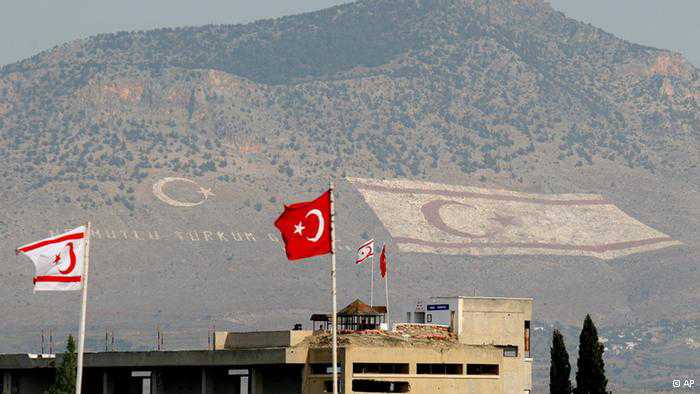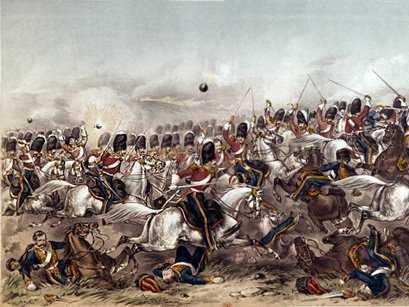Turkey supports northern Cyprus while Greece backs the southern Republic of Cyprus. While Greece is bankrupt, Turkey could help the island bounce back. But only a round of extreme diplomacy could make it happen.
The financial crisis has hit the southern part of divided Cyprus with full force. While a bailout package was finally agreed on at the last minute, the Republic of Cyprus now has to begin the painful process of adapting to the economic situation – just like Greece has had to do. Yet in Cyprus’ Turkish-controlled north, the financial crisis is barely noticeable.
It’s not surprising as Turkey is booming economically, with money regularly flowing across the Mediterranean to the northern part of the island. Without these subsidies, the Turkish Republic of Northern Cyprus, which is not recognized by the international community, could not survive. Yet many Turkish Cypriots would like to liberate themselves from dependence on Turkey, and even voted for reunification with their island neighbors in 2004. Had Greek Cypriots not rejected the plan by a large margin, northern Cyprus would now be a part of the European Union – and thus also a part of the eurozone crisis.
No gloating over Cyprus’ failed economy
The crisis in the Turkish-controlled northern part of the island can mainly be felt in the gaming sector. Since gambling if off limits to citizens of the north, they rely on income from tourists from the southern part of the island. Mesut Sahin, who owns Saray Casino, said revenues have dropped 50 percent since the start of the financial crisis. He added, with sincerity, that he hopes the south will recover quickly.
Ilke Gürdel, a Turkish Cypriot, said there is no reason for Turks in the north to gloat. He said the situation in the north may be better than the south, but it’s still not brilliant, adding that he feels sorry for Greek Cypriots struck by the crisis.

Capital controls limited withdrawals to 300 euros
Turkish Cypriots are now happy not to be a part of the eurozone, placing their confidence in the Turkish lira. But that has not always been the case, said Turkish publicist and Cyprus expert Ayla Gürel.
“The southern part of the island always used to be financially better off than the Turkish north; that’s why the north would always look longingly at the southern standard,” she pointed out. “But since Cyprus’ bankruptcy, this attitude has changed drastically. Now we are quite happy that the island was not reunited in 2004. Otherwise, we would have plunged into the crisis as well.”
Turkey’s role
Despite strained relations between the north and the south, there have also been times when the two parts of the island have cooperated – such as after the explosions at an ammunition depot in 2011. At the time, the Greek Cypriots had to deal with regular power outages. In response, northern Cyprus agreed to temporarily provide electricity. This kind of cooperation is essential during times of crisis, said Harry Tzimitras, director of the Peace Research Institute Oslo, which mediated between the two parts of the island as the peace plan was being drafted for Cyprus in 2004.
Tzimitras said strained diplomatic relations between northern and southern Cyprus are no answer for the indebted south. He observed that the south is under pressure to reconsider its “friendships” after some countries left it in the financial lurch. This could possibly lead to closer relations with Turkey, he said, but Ankara would also have to show its willingness by opening up harbors and airports to the island’s south. Both sides would have to put in a lot of diplomatic effort, but such cooperation would not be easy and is still a long way off, Tzimitras said.

Trucks loaded with money ensured banks had cash for customers
Common interests
Potential for conflict clearly exists, as one recent episode demonstrated. One suggestion for saving Cyprus’ teetering economy is exploiting the Aphrodite gas field in Cypriot waters. But Turkey has said Cyprus may not go it alone and is demanding a say in the matter. Officials in the south do not agree. “It’s one of the most difficult matters to solve, yet cooperation between southern Cyprus and Turkey could bear the most fruit,” Tzimitras stressed.
Another possibility, which Irsen Kücük, Prime Minister of the Turkish Republic of Northern Cyprus, has repeatedly proposed, is the construction of a water pipeline slated for 2014. In the future, water is to be pumped from Turkey to the northern part of the island. The dry south could also use more water, but the southern Cypriot government does not want it to come from Turkey.
Even if such proposals are not welcomed wholeheartedly, at least Cypriots are considering them. That was unheard of in the past, said Tzimitras, who is Greek. “Even with solutions that would work and be acceptable for both sides, things would have to be taken one step at a time,” he noted. “A nearly 40-year-old history cannot be changed overnight.”

Cyprus – like other EU nations – has felt the eurozone crunch
The crisis bringing people closer?
Something positive could come out of the financial crisis for southern Cypriot-Turkish relations, said Turkish Cypriot Gürdal – such as the realization among Greek Cypriots that reunification would have been the smarter solution for the island. For him, it’s clear that “if we had reunited back then, the South would not be in the hole it’s in. Perhaps it will motivate southern Cypriots to negotiate with Turkey.”
But the central condition for Turkey agreeing to improve relations with the southern part of the island is the recognition of the Turkish Republic of Northern Cyprus by the South. Both sides are a long way off from that, with national pride on the part of the Greeks being a hurdle, said Gürel. After all, she pointed out, the Greeks still see the Turks as occupiers of their island.
 The former director of Britain’s external spy service has hinted he might publish his personal account of the decisions that led to Britain’s entry in the Iraq War, if he is criticized in a public inquiry on the subject. Sir Richard Dearlove led the UK’s Secret Intelligence Service, known as SIS or MI6, from 1999 until his retirement in 2004. He is currently on sabbatical from his post as Master of Cambridge University’s Pembroke College, in order to research and author his autobiography. The memoir is believed to be largely preoccupied with the intelligence that led to the British government’s decision to enter the United States-led 2003 war in Iraq. Sir Richard had previously indicated that he intended to make his memoirs posthumously available as a resource to academic researchers. But in an email to British tabloid The Mail on Sunday, he hinted he would consider publishing his personal account if he finds himself criticized by the Iraq Inquiry. Known in Britain as the Chilcot Inquiry, after its Chairman, Sir John Chilcot, the Iraq Inquiry was commissioned by the British government in 2009 to investigate the executive decisions that led the country to participate in the invasion of Iraq. One of the inquiry’s many goals was to evaluate the intelligence provided by MI6 to the government of Prime Minister Tony Blair. There have been rumors that the inquiry’s declassified findings, which are scheduled for publication soon, are critical of MI6’s performance and place particular blame on Sir Richard’s role in the debacle. In his email to The Mail, the former MI6 director made clear he had “no intention, of violating [his] vows of official secrecy”. But he added that he would reconsider his decision to make his memoirs available to scholars only after his death “depending on what Chilcot publishes”. The core of Sir Richard’s dispute with Chilcot is said to center on the claim, propounded by the British government in 2003, that Iraq’s armed forces were able to fire chemical weapon missiles at British troops stationed on the Mediterranean island of Cyprus. This allegation, which found its way to the British press following a series of controlled leaks, largely informed the British government’s public argument in favor of joining the US war effort in Iraq. It later turned out, however, that MI6 had stressed to British government executives that the intelligence referred strictly to short-range battlefield munitions, rather than long-range weapons. Sources close to Sir Richard say he is adamant that the Chilcot inquiry should place the blame for the chemical weapons claim to Prime Minister Blair and his chief spokesperson at the time, Alastair Campbell.
The former director of Britain’s external spy service has hinted he might publish his personal account of the decisions that led to Britain’s entry in the Iraq War, if he is criticized in a public inquiry on the subject. Sir Richard Dearlove led the UK’s Secret Intelligence Service, known as SIS or MI6, from 1999 until his retirement in 2004. He is currently on sabbatical from his post as Master of Cambridge University’s Pembroke College, in order to research and author his autobiography. The memoir is believed to be largely preoccupied with the intelligence that led to the British government’s decision to enter the United States-led 2003 war in Iraq. Sir Richard had previously indicated that he intended to make his memoirs posthumously available as a resource to academic researchers. But in an email to British tabloid The Mail on Sunday, he hinted he would consider publishing his personal account if he finds himself criticized by the Iraq Inquiry. Known in Britain as the Chilcot Inquiry, after its Chairman, Sir John Chilcot, the Iraq Inquiry was commissioned by the British government in 2009 to investigate the executive decisions that led the country to participate in the invasion of Iraq. One of the inquiry’s many goals was to evaluate the intelligence provided by MI6 to the government of Prime Minister Tony Blair. There have been rumors that the inquiry’s declassified findings, which are scheduled for publication soon, are critical of MI6’s performance and place particular blame on Sir Richard’s role in the debacle. In his email to The Mail, the former MI6 director made clear he had “no intention, of violating [his] vows of official secrecy”. But he added that he would reconsider his decision to make his memoirs available to scholars only after his death “depending on what Chilcot publishes”. The core of Sir Richard’s dispute with Chilcot is said to center on the claim, propounded by the British government in 2003, that Iraq’s armed forces were able to fire chemical weapon missiles at British troops stationed on the Mediterranean island of Cyprus. This allegation, which found its way to the British press following a series of controlled leaks, largely informed the British government’s public argument in favor of joining the US war effort in Iraq. It later turned out, however, that MI6 had stressed to British government executives that the intelligence referred strictly to short-range battlefield munitions, rather than long-range weapons. Sources close to Sir Richard say he is adamant that the Chilcot inquiry should place the blame for the chemical weapons claim to Prime Minister Blair and his chief spokesperson at the time, Alastair Campbell.

 Capital controls limited withdrawals to 300 euros
Capital controls limited withdrawals to 300 euros Trucks loaded with money ensured banks had cash for customers
Trucks loaded with money ensured banks had cash for customers Cyprus – like other EU nations – has felt the eurozone crunch
Cyprus – like other EU nations – has felt the eurozone crunch


